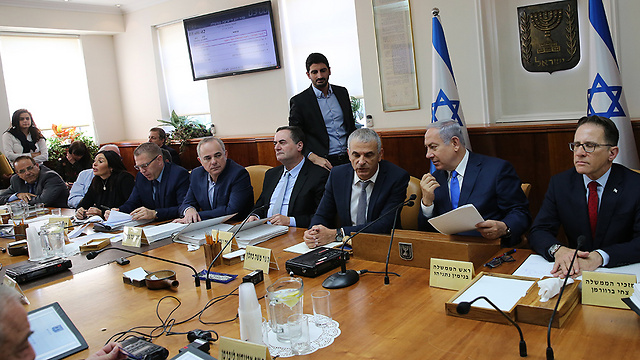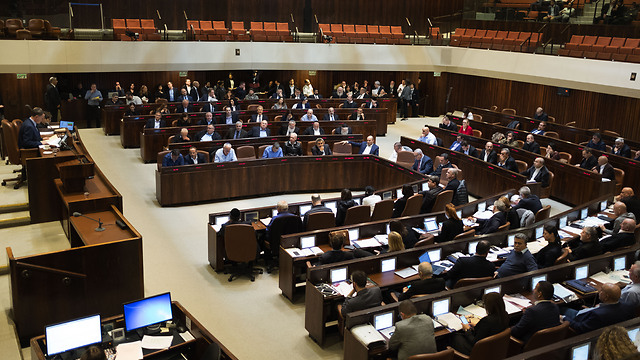

Ministers to get NIS 5,000 pay raise, PM to get NIS 5,500 more
While MKs' salary is linked to the average wage, government members' pay has been linked to the consumer price index; deflation in Israel over the past 4 years led lawmakers' salary surpass that of ministers; solution compares ministers' pay to opposition leader, PM's pay to Knesset speaker.
The Knesset's Finance Committee approved Monday a pay raise of some NIS 5,000 to ministers and some NIS 5,500 to the prime minister, costing the state some NIS 2 million.
Government members' salaries will now be linked to the average wage, after they've stagnated for years when linked to the consumer price index. The change will be done retroactively, as if ministers and the prime minister's salary has always been linked to the average wage.
Prime Minister Benjamin Netanyahu's salary will now be compared to that of Knesset Speaker Yuli Edelstein and increase from NIS 44,100 to NIS 49,600 a month. Ministers' salary, meanwhile, will be compared to that of Opposition leader Isaac Herzog and increase from 39,200 to NIS 44,200.
United Torah MK Moshe Gafni proposed the change after the salary earned by members of Knesset has surpassed that of their colleagues in the government.
So far, lawmakers' salaries have been linked to the average wage in Israel, which increases by 2-3 percent every year. Ministers' salaries, meanwhile, have been linked to the consumer price index since 2001, because at the time it was rising faster than the average wage.
According to data from the Finance Ministry, the average wage has increased by some 31 percent over the past 12 years, while salary linked to the consumer price index rose by only 19.5 percent over the same period, with no increase at all over the past four years, because Israel has been experiencing deflation.
And so, Israel's president, judges and lawmakers—whose salary is linked to the average wage—are expected to see a three percent increase in January, while the prime minister, ministers and deputy ministers would've seen only half a percent increase.
However, it's important to note that in addition to their salary, ministers enjoy social benefits including 26 days of paid vacation a year, an annual grant to buy clothing, an apartment (a minister whose ministry is located in Tel Aviv and lives more than 40 kilometers away can rent an apartment and receive full reimbursements), a armored vehicle with a personal driver, offices both in Jerusalem and Tel Aviv, advisors, assistants, a good pension plan, newspapers, cellphones and fax machines at the state's expense and more.
Three committees have been appointed to resolve the issue, but every time a recommendation has been made to change the practice of linking MKs' salaries to the average wage, it was met with fierce objections from the lawmakers.
During Monday's discussion, Finance Committee Chairman MK Gafni said he had "pangs of conscience over the distorted reality in which MKs make more than ministers. I'm the only one who isn't a populist here. No one else had the courage except for me."
He said ministers told him "because you're cheap, we're not getting a pay raise," and further stressed the initiative is his own as he has not received an official request to update ministers' salaries.
Opposition: MKs can't decide on their own salaries
Members of the opposition objected to the change, arguing lawmakers should not make decisions concerning their own salaries.
"It keeps happening that MKs make decisions on their own affairs in a complete conflict of interest. It's unreasonable," said MK Mickey Rosenthal (Zionist Union). "We need to appoint an external committee."
Yesh Atid MK Mickey Levy echoed Rosenthal's sentiments, saying "It puts the mark of Cain on us in the eyes of the public."
Fellow Yesh Atid MK Yael German offered a different solution—not to raise lawmakers' salaries. "And then we won't make more than ministers. You don't right one wrong with another wrong."
MK Karin Elharar, also of Yesh Atid, lamented that "it looks very bad when ministers are taken care of before the disabled and the elderly."
Meretz MK Ilan Gilon demanded that no decision is made on the ministers' salaries until a solution is found for the disabled. "Appearances are very important. We shouldn't move an inch until the agreement reached two years ago to link disability pensions to the consumer price index is implemented," he said.
He too called to remove the decision on salaries of MKs, ministers and other public servants from the Knesset's hands.
Coalition MKs, meanwhile, supported the initiative. "There's a competition here who is more of a demagogue," said MK Bezalel Smotrich (Bayit Yehudi). "The ministers' salary should be doubled. How can it be that Justice Minister Ayelet Shaked gets the least amount of money among the top members of the Justice Ministry?
MK Oren Hazan (Likud) accused opposition lawmakers of being "hypocrites and liars. You yell about not raising ministers' salaries but enjoy a raise to your own."
He argued that "ministers who have massive budgets should receive a salary that will prevent them from being tempted to seek additional income."

















